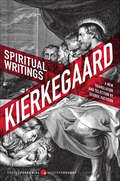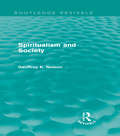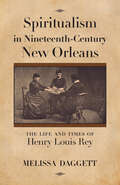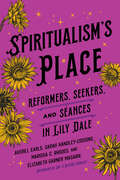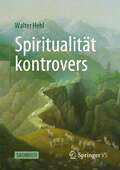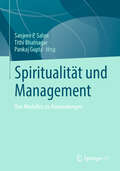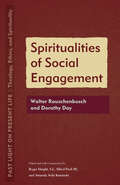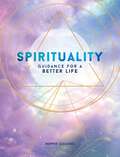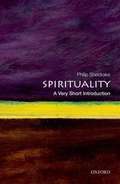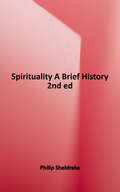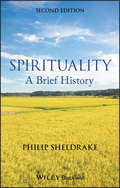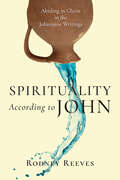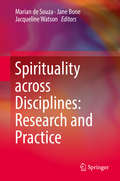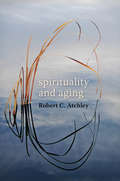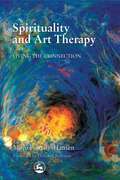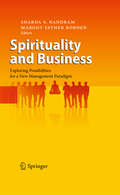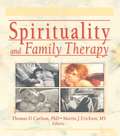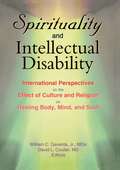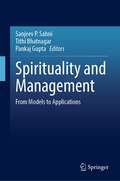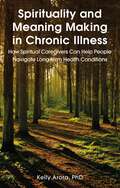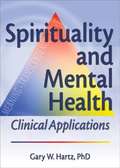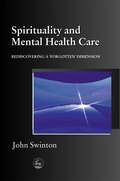- Table View
- List View
Spiritual Writings: A New Translation and Selection (Harper Perennial Modern Thought Ser.)
by Søren Kierkegaard George Pattison“By far the most profound thinker of the 19th century” —Ludwig Wittgenstein “Kierkegaard’s great contribution to Western philosophy was to assert, or to reassert with Romantic urgency, that, subjectively speaking, each existence is the center of the universe.” —John Updike, The New YorkerHarper Perennial Modern Classics presents the rediscovered spiritual writings of Søren Kierkegaard, edited and translated by Oxford theologian George Pattison. Called “the first modernist” by The Guardian and “the father of existentialism” by the New York Times, Kierkegaard left an indelible imprint on existential writers from Sartre and Camus to Kafka and Derrida. In works like Fear and Trembling, Sickness unto Death, and Either/Or, he by famously articulated that all meaning is rooted in subjective experience—but the devotional essays that Patterson reveals in Spiritual Writings will forever change our understanding of the great philosopher, uncovering the spiritual foundations beneath his secularist philosophy.
Spiritualism and Society (Routledge Revivals)
by G. K. NelsonFirst published in 1969, this title explores the origins of Spiritualism as a religious movement. The first part is a history of Spiritualism, with a focus on its origins within America and the development of the organisation within itself. Next, Nelson considers the rise of Spiritualism in Britain, using evidence taken from contemporary journals, other publications and interviews. Finally, the Spiritualist movement is analysed in terms of sociological theory, looking at the Church and the definition of a Cult, as well as concepts of authority and leadership. This is a fascinating work, which will be of great interest to students researching the origins and development of the movement of Spiritualism and its relationship with society.
Spiritualism in Nineteenth-Century New Orleans: The Life and Times of Henry Louis Rey
by Melissa DaggettModern American Spiritualism blossomed in the 1850s and continued as a viable faith into the 1870s. Because of its diversity and openness to new cultures and religions, New Orleans provided fertile ground to nurture Spiritualism, and many séance circles flourished in the Creole Faubourgs of Tremé and Marigny as well as the American sector of the city. Melissa Daggett focuses on Le Cercle Harmonique, the francophone séance circle of Henry Louis Rey (1831-1894), a Creole of color who was a key civil rights activist, author, and Civil War and Reconstruction leader. His life has so far remained largely in the shadows of New Orleans history, partly due to a language barrier.Spiritualism in Nineteenth-Century New Orleans focuses on the turbulent years between the late antebellum period and the end of Reconstruction. Translating and interpreting numerous primary sources and one of the only surviving registers of séance proceedings, Daggett has opened a window into a fascinating life as well as a period of tumult and change. She provides unparalleled insights into the history of the Creoles of color and renders a better understanding of New Orleans's complex history. The author weaves an intriguing tale of the supernatural, of chaotic post-bellum politics, of transatlantic linkages, and of the personal triumphs and tragedies of Rey as a notable citizen and medium. Wonderful illustrations, reproductions of the original spiritual communications, and photographs, many of which have never before appeared in published form, accompany this study of Rey and his world.
Spiritualism's Place: Reformers, Seekers, and Séances in Lily Dale
by Averill Earls Sarah Handley-Cousins Marissa C. Rhodes Elizabeth Garner MasarikIn Spiritualism's Place, four friends and scholars who produce the acclaimed Dig: A History Podcast, share their curiosity and enthusiasm for uncovering stories from the past as they explore the history of Lily Dale. Located in western New York State, the world's largest center for Spiritualism was founded in 1879. Lily Dale has been a home for Spiritualists attempting to make contact with the dead, as well as a gathering place for reformers, a refuge for seekers looking for alternatives to established paths of knowledge, and a target for skeptics. This intimate history of Lily Dale reveals the role that this fascinating place has played within the history of Spiritualism, as well as within the development of the women's suffrage and temperance movements, and the world of New Age religion. As an intentional community devoted to Spiritualist beliefs and practices, Lily Dale brings together multiple strands in the social and religious history of New York and the United States over the past 150 years: feminism, social reform, utopianism, new religious movements, and cultural appropriation. Podcasters and historians alike, Averill Earls, Sarah Handley-Cousins, Elizabeth Garner Masarik, and Marissa C. Rhodes each identify one site in Lily Dale and one theme that its history illuminates. They use those sites and themes to approach Lily Dale not as debunkers but as inquisitive researchers and storytellers. At the same time, they also reflect on their own relationships contending that it's never quite possible to separate grief, hope, faith, and friendship from understandings of the past. Spiritualism's Place breaks myths, unveils unexpected stories, and finds new ways to contemplate Spiritualism's role in American history.
Spiritualität kontrovers
by Walter HehlDas Buch versucht einen fairen Blick auf Spiritualität und Spirituelles aus Sicht der Physik und der modernen Geistesauffassung. So vieles soll spirituell sein, aber was ist es wirklich? Es gibt Aberglauben, Betrug und Illusionen einerseits und moderne Wissenschaft andererseits. Die Wissenschaft zeigt, was Geist ist, dass es unendlich Großes und unendlich Kleines gibt, dass wir so Vieles berechnen können - aber es bleibt das Mysteriöse. Manches in der Wissenschaft ist unmittelbar spirituell, etwa die Figuren von Lichtenberg und Chladni im 18. Jahrhundert und die Kirlian-Fotographie und Tesla-Kugeln heute. Vieles verstehen wir nur oberflächlich. Wenn es der Computer versteht und wir nicht, können wir nicht zufrieden sein. Die Grenzen des Wissens sind weit nach außen verschoben, aber wir sind klein geblieben. Wir stoßen an Grenzen und begegnen Spirituellem: im Unendlichen, im Unausweichlichen und im Unfassbaren. Diese Grenzen sollten uns demütig machen. Die moderne Wissenschaft zeigt diese Grenzen auf. Die Spiritualität ist dann eher die Erfahrung des Mysteriösen des Physikers Albert Einstein. Es gibt Spirituelles, etwa wie eh und je den Anblick des Sternenhimmels oder des Ozeans. Auch heute sind Orte wie Stonehenge spirituelle Plätze oder Kraftörter. Der Magnetismus im Elektrofahrzeug ist so spirituell wie im Magnetstein der Antike. Besonders spirituell ist die Verbindung der Natur mit der Mathematik.
Spiritualität und Management: Von Modellen zu Anwendungen
by Sanjeev P. Sahni Tithi Bhatnagar Pankaj GuptaDieses Buch erörtert die Bedeutung der Integration von Spiritualität aus vielfältigen Wissenshintergründen, um in der alltäglichen Anwendung wirksam zu sein. Indem es weltweit führende Experten auf diesem Gebiet zusammenbringt, bietet das Buch einen umfassenden Überblick über verschiedene Themen, Modelle, Ansätze und Komplexitäten von Spiritualität und Management. Die Kapitel des Buches befassen sich mit Überlegungen zur Weisheit aus der Bhagavadgita und dem Buddhismus, dem Einfluss von Spiritualität auf gute Führung, Lebensqualität, die Integration von Ethik, menschlichen Werten und Glück, Meditation sowie der Verknüpfung von Spiritualität und Management und deren Auswirkungen auf Führung und Arbeitsumgebung. Ein anregender Lesestoff für Wissenschaftler, Studierende und Entscheidungsträger, bietet dieses Buch eine indische Perspektive auf das Management von Spiritualität am Arbeitsplatz. In der post-COVID-19-Situation gewinnt das Buch noch mehr an Relevanz, da es sich auf die ganzheitliche Entwicklung von Menschen und Organisationen konzentriert.
Spiritualities of Social Engagement: Walter Rauschenbusch and Dorothy Day (Past Light on Present Life: Theology, Ethics, and Spirituality)
by Roger Haight, SJ, Alfred Pach III, and Amanda Avila KaminskiThis volume considers two authors who represent different but complementary responses to social injustice and human degradation. The writings of Walter Rauschenbusch and Dorothy Day respond to an American situation that arose out of the Industrial Revolution and reflect especially—but not exclusively—urban life on the East Coast of the United States during the late nineteenth and first half of the twentieth centuries. Although these two authors differ greatly, they both reacted to the extreme social inequality and strife that occurred between 1890 and the beginning of World War II. They shared a total commitment to the cause of social justice, their Christian faith, and an active engagement in the quest for a just social order. But the different ways they reacted to the situation generated different spiritualities. Rauschenbusch was a pastor, writer, historian, and seminary professor. Day was a journalist who became an organizer. The strategic differences between them, however, grew out of a common sustained reaction against the massive deprivation that surrounded them. There is no spiritual rivalry here. They complement each other and reinforce the Christian humanitarian motivation that drives them. Their work brings the social dimension of Christian spirituality to the surface in a way that had not been emphasized in the same focused way before them. They are part of an awakening to the degree to which the social order lies in the hands of the people who support it. Both Rauschenbusch and Day are examples of an explicit recognition of the social dimension of Christian spirituality and a radical acting-out of that response in two distinctly different ways.
Spirituality: Guidance for a Better Life
by Sophie GoldingConnect to your inner self and the world around you and enjoy a new sense of peace and happiness. This stunning book will help you along your own spiritual journey, by introducing you to traditions, philosophies and practices which have the power to open your heart and broaden your mind. Along with tips on how to practise spirituality in your everyday life, this book provides the stepping stones to a more fulfilling life.
Spirituality: Guidance for a Better Life
by Sophie GoldingConnect to your inner self and the world around you and enjoy a new sense of peace and happiness. This stunning book will help you along your own spiritual journey, by introducing you to traditions, philosophies and practices which have the power to open your heart and broaden your mind. Along with tips on how to practise spirituality in your everyday life, this book provides the stepping stones to a more fulfilling life.
Spirituality (A Very Short Introduction)
by Philip SheldrakeIt has been suggested that 'spirituality' has become a word that 'can define an era'. Why? Because paradoxically, alongside a decline in traditional religious affiliations, the growing interest in spirituality and the use of the word in a variety of contexts is a striking aspect of contemporary western cultures. Indeed, spirituality is sometimes contrasted attractively with religion, although this is problematic and implies that religion is essentially dogma, moralism, institutions, buildings, and hierarchies. <p><p> The notion of spirituality expresses the fact that many people are driven by goals that concern more than material satisfaction. Broadly, it refers to the deepest values and sense of meaning by which people seek to live. Sometimes these values are conventionally religious. Sometimes they are associated with what is understood as 'the sacred' in a broader sense - that is, of ultimate rather than merely instrumental importance. This Very Short Introduction, written by one of the most eminent scholars and writers on spirituality, explores the historical foundations of the thought and considers how it came to have the significance it is developing today.
Spirituality: A Brief History
by Philip SheldrakeEngagingly written by one of the world's leading scholars in this field, this comprehensively revised edition tells the story of Christian spirituality from its origins in the New Testament right up to the present day. - Charts the main figures, ideas, images, and historical periods, showing how and why spirituality has changed and developed over the centuries - Includes new chapters on the nature and meaning of spirituality, and on spirituality in the 21st century; and an account of the development and main features of devotional spirituality - Provides new coverage of Christian spirituality's relationship to other faiths throughout history, and their influence and impact on Christian beliefs and practices - Features expanded sections on mysticism, its relationship to spirituality, the key mystical figures, and the development of ideas of 'the mystical' - Explores the interplay between culture, geography, and spirituality, taking a global perspective by tracing spiritual developments across continents.
Spirituality
by Philip SheldrakeEngagingly written by one of the world's leading scholars in this field, this comprehensively revised edition tells the story of Christian spirituality from its origins in the New Testament right up to the present day.Charts the main figures, ideas, images and historical periods, showing how and why spirituality has changed and developed over the centuries Includes new chapters on the nature and meaning of spirituality, and on spirituality in the 21st century; and an account of the development and main features of devotional spiritualityProvides new coverage of Christian spirituality's relationship to other faiths throughout history, and their influence and impact on Christian beliefs and practicesFeatures expanded sections on mysticism, its relationship to spirituality, the key mystical figures, and the development of ideas of 'the mystical'Explores the interplay between culture, geography, and spirituality, taking a global perspective by tracing spiritual developments across continents
Spirituality According to John: Abiding in Christ in the Johannine Writings
by Rodney ReevesThrough all of John's works, a consistent message is woven: being a Christian is about abiding in Christ and in his words. The Gospel of John, the epistle of 1 John, and the Apocalypse all begin in the same way: by pointing to the importance of knowing the Word, both written and incarnate. Using an artistic, storytelling approach to spirituality, John relies heavily on readers' imaginations to help them see what it takes to become disciples by abiding in Jesus. Rodney Reeves combines exegesis with spiritual reflection to explore how the only biblical writer to employ three different genres presents a consistent vision of Christian spirituality. Rather than focusing on detailed instructions, John uses evocative metaphors and illustrations so that readers can envision how to follow Jesus—as disciples, in community, and even at the end of the world. Filled with stories and implications for today's readers, Spirituality According to John provides an accessible introduction to the rich spiritual world of the Johannine literature that makes up much of the New Testament. In John's era and now, anyone who has ears to hear can learn to truly abide in Christ.
Spirituality across Disciplines: Research and Practice:
by Marian De Souza Jane Bone Jacqueline WatsonThis book collects multiple disciplinary voices which explore current research and perspectives to discuss how spirituality is understood, interpreted and applied in a range of contexts. It addresses spirituality in combination with such topics as Christian mysticism, childhood and adolescent education, midwifery, and sustainability. It links spirituality to a variety of disciplines, including cognitive neuroscience, sociology, and psychology. Finally, it discusses the application of spirituality within the context of social work, teaching, health care, and occupational therapy. A final chapter provides an analytical discussion of the different voices that appear in the book and offers a holistic description of spirituality which has the potential to bring some unity to the meaning, expression and practice of spirituality across a variety of disciplines as well as across cultural, religious and secular worldviews. "A strength of the book is that each chapter is characterized by a fearless confronting of oppositional perspectives and use of the latest research in addressing them. The book takes the difficult topic of spirituality into almost every nook and cranny of personal and professional life. There is a persistent grasping of the contentiousness of the topic, together with addressing counter positions and utilizing updated research across a range of fields in doing this. The opening and closing chapters serve as book ends that keep the whole volume together. " Terence Lovat, The University of Newcastle, Australia "The interdisciplinary nature of the work is by far the strongest aspect of this volume. It has the potential to contribute to a dialogue between different professions and disciplines. This prospective publication promises to promote a more holistic approach to the study of spirituality. This volume takes into consideration a wide variety of issues. The way the editors have structured the sequence of chapters contributes to facilitate any possible dialogue between the different areas. " Adrian-Mario Gellel, University of Malta, Malta
Spirituality and Aging
by Robert C. AtchleyWinner, 2009 Richard Kalish Innovative Publication Award. Gerontological Society of AmericaA spiritual life, one focused on personal growth and deep human experience, is a major focus and motivator for people over the age of forty. Yet there is a marked lack of rigorous academic study of spirituality's importance in the lives of aging people. Noted gerontologist Robert C. Atchley remedies this problem by developing complex concepts and language about spirituality.Spirituality and Aging incorporates material from two decades of interviews, observations, study, and reflection to illustrate ways of thinking about and discussing spirituality—what it is, why it is important, and how it influences the experience of aging. This book provides a nuanced view of spirituality and the richness it brings to the lives of older people. The book is divided into three sections, with the first providing basic frames of reference for examining spirituality and aging, such as the nature of spirituality, spiritual development, and the spiritual self. Atchley next focuses on two dimensions of spirituality that are likely to manifest later in life: becoming a sage (developing the capacity to bring spiritual light to everyday issues) and serving from spirit (creating opportunities for service that are rooted in spirituality). The last section illustrates how spirituality informs other aspects of late life, such as psychological coping and the experience of dying and death.Separating spirituality from religion—something few books on this topic do—Spirituality and Aging offers a plan for incorporating spirituality into gerontological scholarship, research, education, and practice.
Spirituality and Art Therapy: Living the Connection
by Carol Sagar Janis Timm-Bottos Mimi Farrelly-Hansen Edit Zaphir-Chasman Michael Franklin Madeline Rugh Bernie Marek Catherine Moon Suzanne Lovell Cam BuschReflecting the increasing recognition of the importance of the spiritual in healing, Spirituality and Art Therapy is an exciting exploration of the different ways in which the spiritual forms an essential, life-enhancing component of a well-rounded therapeutic approach. The contributors are leading art therapists who write from diverse perspectives, including Christian, Jewish, Buddhist and shamanic. They explain how their own spiritual and creative influences interact, finding expression in the use of art as a healing agent with specific populations, such as bereaved children, emotionally disturbed adolescents, and the homeless. The relationships between spirituality and visual art, art therapy and transpersonal psychology are examined. Story and image are interwoven in the spiritual journeys of therapists and clients, and suggested creative exercises make this an accessible, practical resource for those who desire to understand and execute an holistic method of therapy. Arguing that art therapists can mediate between the sacred and the mundane, this pioneering book is an affirmation of the transformative power of art therapy.
Spirituality and Business
by Margot Esther Borden Sharda S. NandramThe effects of globalization influence corporate life and entrepreneurial culture and the implications are felt, directly or indirectly, by every world citizen. This book examines our inevitable relationship with business and the drives behind the way we do business. In a nutshell: 'me and mine' or 'thee and thine'. The former ends up in a cul-de-sac of individual and collective emptiness, alienation and self-destruction. The latter involves a transformation in the way we do business and leads to such benefits as collaboration, mutual enrichment and our livelihood being an integral part of our quest for a meaningful and fulfilling life. Spirituality is presented in this book as a possibility for providing a non-denominational inspiration and framework - both in theory and practice - for bringing about an inner transformation resulting in a new paradigm for business and management.
Spirituality and Business: An Open Letter to Christian Leaders in Times of Urgency
by Philippe de WootAre the demands placed on 21st-century business leaders compatible with Christian values? Is it possible to act ethically and be socially responsible within a global system driven by economic demands? This important book explores the current conflict between spirituality and corporate leadership and asks challenging questions of business leaders and decision-makers.
Spirituality and Family Therapy
by Martin John Erickson Thomas CarlsonLet spirituality enhance the effectiveness of your marriage and family therapy practice! The field of marriage and family therapy is starting to acknowledge that spiritual and religious issues are a valuable part of the lives of both clients and therapists. Spirituality and Family Therapy provides you with important information about this growing trend, including guidelines for therapists who are unsure how to integrate spiritual issues into their practice and detailed case studies that reveal how and why faith is a vital part of many clients' lives. Along with these features, you'll also find two unique conversational-style chapters where various authors explore their own beliefs and discuss the role of religion in their lives and careers. Spirituality and Family Therapy will help you understand your own spirituality, and use it as an important resource in your relationships with clients. In Spirituality and Family Therapy you'll learn about: the links between faith, fathering, and family therapy clinical applications for Christian mediation making altars as a way to help your clients come to terms with loss the ways spirituality helps parents cope with the death of a child ways to integrate the spirituality of the therapist into your work the value of faith in services for Alzheimer's caregivers integration of religion, gender, and spirituality in clinical practice
Spirituality and Intellectual Disability: International Perspectives on the Effect of Culture and Religion on Healing Body, Mind, and Soul
by William C Gaventa David CoulterLearn about inclusive religious practices from around the world!With a multidisciplinary and anthropological perspective, Spirituality and Intellectual Disability: International Perspectives on the Effect of Culture and Religion on Healing Body, Mind, and Soul takes a fresh, innovative look into the world of religious and spiritual practices for the intellectually disabled. Containing vital insights from the first strand on spiritualit and disability at the quadrennial conference of the International Association for Scientific Study of Intellectual Disability (Seattle, 2000), this book provides a framework for bridging the gap between science and faith. It explores the ways in which faith traditions, cultural backgrounds, and professional roles can help bring about a consensus about what spiritual health means within specific cultures and faiths and across disciplines. This informative book examines and provides cutting-edge information on: recognition of spirituality in health care defining and assessing spirituality and spiritual supports perspectives on intellectual disability from Judiasm, Islam, Roman Catholicism, and Native American spirituality creative models of community ministry and religious education liturgical celebrations with people who have severe mental disabilities
Spirituality and Management: From Models to Applications
by Pankaj Gupta Sanjeev P. Sahni Tithi BhatnagarThis book discusses the importance of integrating spirituality from diverse knowledge backgrounds to be effective in its everyday use. Bringing together global experts in the field, this book provides an extensive overview of the various spirituality and management themes, models, approaches, and complexities. The chapters in the book include deliberations upon wisdom from the Bhagwat Gita; Buddha; the impact of spirituality on good governance, quality of life; integrating ethics, human values, happiness; meditation; and linking of spirituality and management and their effect on leadership, and workplace environment. A thought-provoking read for scholars, students, and policy-makers, this book provides an Indian perspective on managing spirituality at work. This book is even more relevant in the post-COVID-19 scenario as it focuses on the holistic development of people and organizations.
Spirituality and Meaning Making in Chronic Illness: How Spiritual Caregivers Can Help People Navigate Long-term Health Conditions
by Kelly AroraMany spiritual caregivers, including chaplains, spiritual directors and clergy, are unaware of how they can support people with chronic health conditions. This book combines insights on chronic illness with spiritual care skills and suggestions to enhance well-being for people living with long-term illness.Using a narrative approach, the author reflects on the stories of two women - Dorothy from The Wizard of Oz, who travels from Kansas (a state of health) to Oz (an illness experience), alongside the author's personal experiences of managing an incurable autoimmune disease. Chapters will include guidelines and exercises that help equip caregivers to facilitate healing with people who live with long-term health conditions.
Spirituality and Mental Health: Clinical Applications
by Gary W. HartzLearn to conduct a client-centered assessment of spirituality and use the findings to enhance your interventions as well as your clients' psychospiritual coping abilities Even to clinicians practiced in helping clients to manage their stress, the impact of clients' spirituality upon their mental health can be difficult to discern and discuss. Moreover, ethical dilemmas can arise when clinicians feel compelled to intervene with a client's negative religious coping. Spirituality and Mental Health: Clinical Applications can help. This thought-provoking guide for mental health professionals and pastoral counselors provides you with a framework to assess and incorporate client-based spirituality into your practice. The author provides case examples and clinical models related to spirituality and mental health, as well as useful questionnaires for assessing clients. He provides a client-centered ethical framework for integrating spirituality into treatment, and then discusses how to apply it to clients' problems, especially those related to life crises, resentment over past offenses, guilt over past mistakes, and substance abuse. He also discusses how mindfulness meditation can enhance clients' coping ability. Finally, he includes a useful Leader's Guide for the psychoeducational spirituality group, which is designed to educate patients and church groups. Spirituality and Mental Health: Clinical Applications shows how professionals in the above disciplines can address the impact of spirituality on clients by: gaining an understanding of the construct of spirituality assessing spirituality and its interface with clients' presenting problems, particularly when spirituality is central to their values. intervening sensitively in ways that use clients' spiritual perspectives and practices to enhance their coping mechanisms.
Spirituality and Mental Health: Clinical Applications
by Gary W HartzLearn to conduct a client-centered assessment of spirituality-and use the findings to enhance your interventions as well as your clients' psychospiritual coping abilities Even to clinicians practiced in helping clients to manage their stress, the impact of clients&’ spirituality upon their mental health can be difficult to di
Spirituality and Mental Health Care: Rediscovering a 'Forgotten' Dimension
by John SwintonA person's sense of spirituality informs his or her awareness of self and of the society around them, and is intrinsic to their mental well-being. In this balanced and thoughtful book John Swinton explores the connections between mental health or illness and spirituality and draws on these to provide practical guidance for people working in the mental health field. He analyses a range of models of mental health care provision that will enable carers to increase their awareness of aspects of spirituality in their caring strategies. Using a critical evidence-based and interdisciplinary approach to contemporary mental health practice, Swinton explores the therapeutic significance of spirituality from the perspectives of both carers and service-users, looking at mental health problems such as psychotic disorder and depression, Alzheimer's disease and bipolar disorder. He also provides a critical review of existing literature in the field to place spirituality in contemporary theory and practice.
